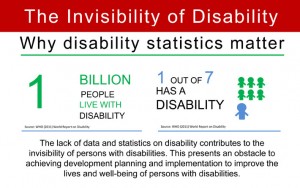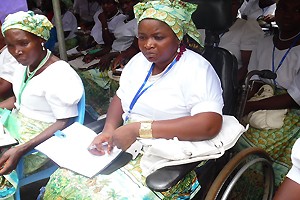Lack of data and information on disability and the status of persons with disabilities at the national level makes them invisible in official statistics and impedes the achievement of disability-inclusive development planning and implementation.
The UN General Assembly, in several resolutions, has stressed the importance of improving data and statistics on disability. In particular, data needs to be collected in line with international standards to be internationally comparable. The Washington Disability Statistics Group, a group working under the auspices of the UN Statistical Commission, has developed a set of internationally comparable questions for censuses and surveys. Data collected through these questions will help monitor development goals for persons with disabilities.
Disability indicators in the SDG framework
The UN Convention on the Rights of Persons with Disabilities Secretariat, with contributions and support from the World Health Organization, and in consultation with experts from international organizations and disability organizations, prepared a technical note, which has been submitted to the IAEG-SDGs.
Reference to disability in the Sustainable Development Goals (SDGs) indicators (agreed by the United Nations Statistical Commission in March 2016)

Current Guidelines for Collecting Fault Data
Washington Group Survey and Census Questions
In 2014, the United Nations Statistical Commission recognized the Washington Group’s work on disability statistics. These work includes six questions that can be included in censuses and surveys to collect data on people with disabilities.
Census Recommendations
On 10 June 2015, the UN Economic and Social Council adopted a resolution entitled “Planning the 2020 World Population and Housing Census” (E/CN.3/2015/6). The resolution emphasizes that the Population and Housing Census is designed to generate valuable statistics and indicators to assess the situation of persons with disabilities. Updated recommendations for collecting data on persons with disabilities in the census are set out in the Principles and Recommendations for Population and Housing Censuses (Revised Second Edition), p. 178.
Global Use of the Washington Group Questions
Data collected through the Washington Group’s census and survey questions will help monitor the SDGs on education and employment, including targets for children and people with disabilities.
The following countries/territories included the Washington Group question in their last census:
Albania (2011), American Samoa (2010), Aruba (2010), Belize (2010), Brazil (2010), Democratic People’s Republic of Korea (2008), Guam (2010), Indonesia (2010), Israel (2008), Italy (2012), Jamaica (2010), Marshall Islands (2011), Mauritius (2011), Micronesia (2010), Nauru (2011), Northern Mariana Islands (2010), Qatar (2010), Romania (2011), Saint Lucia (2010), Senegal (2013), Serbia (2011), Solomon Islands (2009), South Africa (2011), Sri Lanka (2012), State of Palestine (2007), Timor-Leste (2010), Tonga (2009), Trinidad and Tobago (2012) (2011), Turkey (2011), United States (2010), U.S. Virgin Islands (2010), Vanuatu (2009), and Vietnam (2009).
Source: United Nations Statistics Division and Secretariat of the Convention on the Rights of Persons with Disabilities. Please send updates to this list to [email protected].
Collecting data on children with disabilities
UNICEF and the Washington Disability Statistics Group are currently developing a set of questions to collect data on children with disabilities in the survey.
Past Conferences on Outage Data, Statistics, Monitoring and Evaluation
Expert Meeting on Monitoring and Evaluation for Disability-Inclusive Development, 10-11 May 2017, ILO Headquarters, Geneva, Switzerland The regional meeting on disability measurement and statistics in support of the 2030 Agenda for Sustainable Development and the 2020 World Population and Housing Census Programme (26-28 July, Bangkok, Thailand) was hosted by the UN Statistics Division in collaboration with the UN Economic Commission for Asia and the Pacific (ESCAP). The meeting will review and discuss country experiences on approaches taken to measure disability populations in the 2010 census, discuss strategies for compiling disability data for monitoring the SDGs, share country experiences among participating countries, and promote regional cooperation aimed at strengthening national capacities in disability measurement and improving the quality of data for monitoring the SDGs.UN Expert Group Meeting on Disability Data and Statistics, Monitoring and Evaluation: Future Direction of the Disability-Inclusive Development Agenda Beyond 2015, 8-10 July 2014, UNESCO Headquarters, Paris Interactive Panel Discussion on “Informal Network on Disability Statistics for Inclusive Development” at the 45th Meeting of the Statistical Commission, 4 March 2014, United Nations Headquarters, New York Interactive Panel Discussion on “Disability Data and Statistics for Inclusive Development: Next Steps at the Global, Regional and National Levels” at the 43rd Meeting of the Statistical Commission, 1 March 2012, United Nations Headquarters, New York Panel Discussion: Towards Inclusive Development: Improving Disability Data and Statistics, 2 December 2011, United Nations Headquarters, New York Workshop on Disability Statistics in the ESCWA Region, 21-23 March 2005, Beirut, Lebanon Report of the Meeting on Disability Measurement in ESCWA Countries, 1-5 June 2016, Cairo, Egypt, 2002United Nations Group of Experts Meeting on Monitoring and Evaluation of Disability-Sensitive Policies and Programmes, 3-5 December 2001, United Nations Headquarters, New York International Seminar on Measuring Disability, 4-6 June 2001, New York Helmsley Hotel, New York
United Nations Resolution on Disability Monitoring and Evaluation, Data and Statistics
Economic and Social Council resolution “2020 World Population and Housing Census Programme” E/CN.3/2015/6
This resolution by the United Nations Economic and Social Council (ECOSOC) emphasizes that the Population and Housing Census is designed to generate valuable statistics and indicators to assess the situation of persons with disabilities. General Assembly Resolution A/RES/65/186
Resolution 65/186 calls on Governments to strengthen the collection and compilation of national data and information on the situation of persons with disabilities, disaggregated by sex and age, in accordance with existing guidelines on statistics on persons with disabilities, which they can use to ensure disability-sensitive planning, monitoring, evaluation and implementation of development policies, particularly in the realization of the Millennium Development Goals for persons with disabilities. It also requests Governments to provide relevant data and statistics, where available, to appropriate mechanisms within the United Nations system, including statistical commissions. General Assembly resolution A/RES/64/131
In this resolution, the General Assembly calls on Governments to build a knowledge base of data and information on the situation of persons with disabilities that can be used to facilitate the planning, monitoring, evaluation and implementation of disability-sensitive development policies. Particular attention is given to the realization of the Millennium Development Goals for persons with disabilities and in this regard the General Assembly will:
(a) Request the Secretary-General to widely disseminate and promote the use of the Guidelines and Principles for the Development of Disability Statistics and the Principles and Recommendations for Population and Housing Censuses, and to facilitate technical assistance, within existing resources, including the provision of capacity-building assistance to Member States, in particular to developing countries;
(b) Encourage Member States to use statistics, to the extent possible, and to incorporate a disability perspective in the review of progress towards the realization of the Millennium Development Goals for all.
The resolution requests the Secretary-General to give high priority to the concerns and issues relating to persons with disabilities and to include persons with disabilities in the work programme of the United Nations system, with a view to ensuring that the perspective of persons with disabilities is included in the 2010 World Population and Housing Census planning.
Main Publications
“A world worth living in: Harnessing the data revolution for sustainable development”, UN Secretary-General’s Independent Advisory Group of Experts on the Data Revolution for Sustainable Development. The report noted a lack of data on persons with disabilities and recommended disaggregating data by disability. November 2014 “Disability at a glance 2012: Strengthening the evidence base in Asia and the Pacific”, UN ESCAP World Report on Disability, World Health Organization (WHO) and World Bank, 2011 “Strategic Action for Inclusive Development: Disability, Human Rights and Statistics”, UN Department of Economic and Social Affairs (DESA), 2010 “Statistics on the employment status of persons with disabilities: an overview of country methodologies”, Working Paper No. 40, ILO Statistics Division, in collaboration with the InFocus Programme on Skills, Knowledge and Employability Statistics Division, Policy Integration Division, International Labour Organization, Geneva, April 2004


